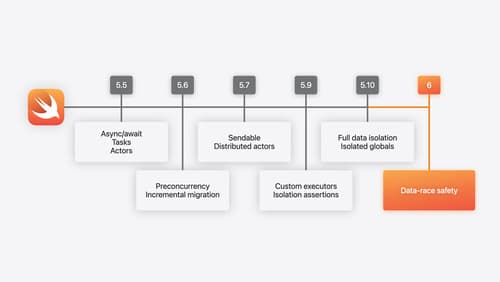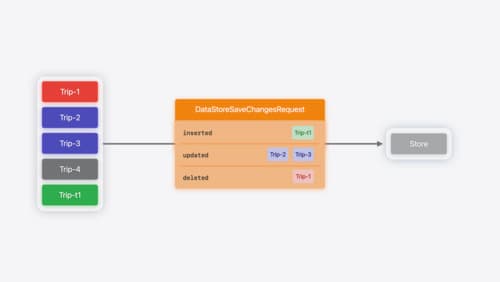whats new in swiftdata
Asked on 2024-09-06
1 search
In the WWDC 2024 sessions, several new features and improvements were introduced for SwiftData. Here are the highlights:
-
Custom Data Stores: SwiftData now allows the use of custom data stores, enabling developers to store data using alternative backends like SQLite, remote web services, or JSON files. This flexibility is achieved through a new datastore protocol, which supports any persistence backend (Create a custom data store with SwiftData).
-
Schema Customization: A new schema macro helps avoid duplicate models, and there are new ways to set up and configure model containers. This includes the use of the
#Uniquemacro to ensure no duplicate entries in a set of properties (What’s new in SwiftData). -
Indexing and Unique Constraints: The addition of
#Indexand#Uniquemacros makes queries more efficient and ensures data integrity by preventing duplicate entries (Platforms State of the Union). -
History API: SwiftData now provides access to the history of changes in a datastore, which is useful for tracking local changes that need to be synced to a remote web service (What’s new in SwiftData).
-
Query Optimization: New macros and features have been introduced to optimize queries with complex filters, improving performance (What’s new in SwiftData).
These updates make SwiftData a more powerful and flexible framework for managing app data across Apple's platforms.

What’s new in Swift
Join us for an update on Swift. We’ll briefly go through a history of Swift over the past decade, and show you how the community has grown through workgroups, expanded the package ecosystem, and increased platform support. We’ll introduce you to a new language mode that achieves data-race safety by default, and a language subset that lets you run Swift on highly constrained systems. We’ll also explore some language updates including noncopyable types, typed throws, and improved C++ interoperability.

What’s new in SwiftData
SwiftData makes it easy to add persistence to your app with its expressive, declarative API. Learn about refinements to SwiftData, including compound uniqueness constraints, faster queries with #Index, queries in Xcode previews, and rich predicate expressions. Join us to explore how you can use all of these features to express richer models and improve performance in your app. To discover how to build a custom data store or use the history API in SwiftData, watch “Create a custom data store with SwiftData” and “Track model changes with SwiftData history”.

Create a custom data store with SwiftData
Combine the power of SwiftData’s expressive, declarative modeling API with your own persistence backend. Learn how to build a custom data store and explore how to progressively add persistence features in your app. To get the most out of this session, watch “Meet SwiftData” and “Model your schema with SwiftData” from WWDC23.
